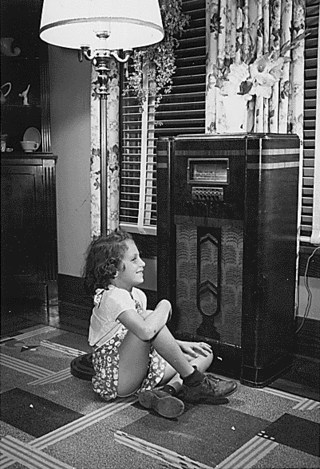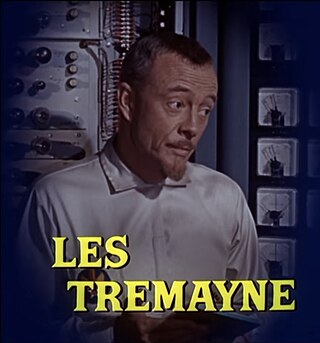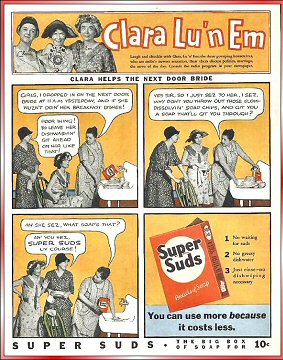
The Golden Age of Radio, also known as the old-time radio (OTR) era, was an era of radio in the United States where it was the dominant electronic home entertainment medium. It began with the birth of commercial radio broadcasting in the early 1920s and lasted through the 1950s, when television gradually superseded radio as the medium of choice for scripted programming, variety and dramatic shows.

Amos 'n' Andy was an American radio sitcom about black characters, initially set in Chicago then later in the Harlem section of New York City. While the show had a brief life on 1950s television with black actors, the 1928 to 1960 radio show was created, written and voiced by two white actors, Freeman Gosden and Charles Correll, who played Amos Jones (Gosden), Andrew Hogg Brown (Correll), and George "Kingfish" Stevens (Gosden) as well as incidental characters. On television from 1951 to 1953, black actors took over the majority of the roles; white characters were infrequent.

Don Ameche was an American actor, comedian and vaudevillian. After playing in college shows, repertory theatre, and vaudeville, he became a major radio star in the early 1930s, which led to the offer of a movie contract from 20th Century Fox in 1935.

WTAG is a radio station in Worcester, Massachusetts. It is owned by iHeartMedia and airs a news/talk format. WTAG's studios are in Paxton and it broadcasts from a transmitter in Holden, Massachusetts. The transmitter operates at 5,000 watts day and night. WTAG programming is simulcast on FM translator W235AV at 94.9 MHz, licensed to Tatnuck.

Ayds Reducing Plan Candy was an appetite-suppressant candy introduced around 1940 in the United States.
The Yankee Network was an American radio network, based in Boston, Massachusetts, with affiliate radio stations throughout New England. At the height of its influence, the Yankee Network had as many as twenty-four affiliated radio stations. The network was co-founded by John Shepard III and his brother Robert, in 1929–1930. The beginnings of what became the Yankee Network occurred in the mid-1920s, when John Shepard's Boston station WNAC linked by telephone land lines with Robert Shepard's station in Providence, Rhode Island, WEAN, so that the two stations could share or exchange programming. Those two stations became the first two Yankee Network stations. In 1930, they were joined by the first affiliated radio stations, including WLBZ in Bangor, Maine; WORC in Worcester, Massachusetts; WNBH in New Bedford, Massachusetts; and WICC in Bridgeport, Connecticut. During the 1930s, the network became known for developing its own local and regional news bureau, the Yankee News Service. The Yankee Network and the Yankee News Service operated until February 1967.

Olan Soule was an American actor, who had professional credits in nearly 7,000 radio shows and commercials, appearances in 200 television series and television films, and in over 60 films.

Barbara Luddy was an American actress best known for her voiceover work for Walt Disney Studios in the 1950s, 1960s and 1970s.

The Chase and Sanborn Hour is the umbrella title for a series of American comedy and variety radio shows sponsored by Standard Brands' Chase and Sanborn Coffee, usually airing Sundays on NBC from 8 p.m. to 9 p.m. during the years 1929 to 1948.
The Adventures of the Thin Man radio series, initially starring Les Damon, was broadcast on all four major radio networks during the years 1941 to 1950. Claudia Morgan had the female lead role of Nora Charles throughout the program's entire nine-year run. The radio series was modeled after the film series which was based on the 1934 Dashiell Hammett novel.
The year 1944 saw a number of significant happenings in radio broadcasting history.
Author's Playhouse is an anthology radio drama series created by Wynn Wright, that aired on Mutual in 1940–1941, and on the NBC Blue Network from March 5, 1941, until October 1941. It then moved to the NBC Red Network where it was heard until June 4, 1945. Philip Morris was the sponsor between 1942 and 1943.

The Campana Factory is a historic building in Batavia, Illinois. It was built in 1936 to serve as a factory for The Campana Company, which produced Italian Balm, the most popular hand lotion in the United States during The Great Depression. The Streamline Moderne and Bauhaus building features many innovative technologies, such as air conditioning. It was added to the National Register of Historic Places in 1979.

Lester Tremayne was a British actor.

Clara, Lu, 'n Em is a radio soap opera, which first aired on June 16, 1930, over WGN-AM Chicago, Illinois. The show was picked up by the NBC Blue radio network and premiered at 10:30 p.m. Eastern Time on January 27, 1931. Thus, it became the first nationally broadcast radio soap opera. When Clara, Lu 'n Em was moved to a regular daytime time slot on February 15, 1932, it became the first networked daytime soap opera.

Campana Corporation of Batavia, Illinois, was a major manufacturer of cosmetics in the 20th century.

Lester Joseph Damon was an American character actor best known for his nearly 30 years performing on radio. Out of all his appearances on radio, Damon was best remembered for his roles as Nick Charles on The Adventures of the Thin Man from 1941-1943 and again from 1946-1950 on NBC then CBS and as Michael Waring on The Falcon from 1950-1953 on Mutual.
Betty and Bob is a 1932-1940 radio soap opera. The soap opera follows the lives of Betty and Bob Drake. Betty was a secretary who falls madly in love with her boss, bachelor Bob Drake. The two wed and each day, the subject matter dealt with everything from love to hate, jealousy to divorce, murder to betrayal, and collusion to insanity.
Curtain Time is a radio anthology program in the United States. It was broadcast on ABC, CBS Mutual, and NBC during the old-time radio era, beginning in 1938 and ending in 1950.












